It's A "Geopolitical Earthquake": A Stunned World Responds After Saudi Alliance Cuts All Ties With Qatar
Virtually nobody saw it coming.
Late on Sunday night, the Saudi-led alliance of Gulf Arab states, Saudi Arabia, the UAE and Bahrain including Egypt, shocked the world when they announced they had severed ties and closed borders with one of the Gulf's wealthiest, if smallest, neighbors Qatar, a (now former) member of the Gulf Cooperation Council in what we called a "geopolitical earthquake" and what Bloomberg dubbed "an unprecedented move designed to punish one of the region’s financial superpowers for its ties with Iran and Islamist groups in the region."
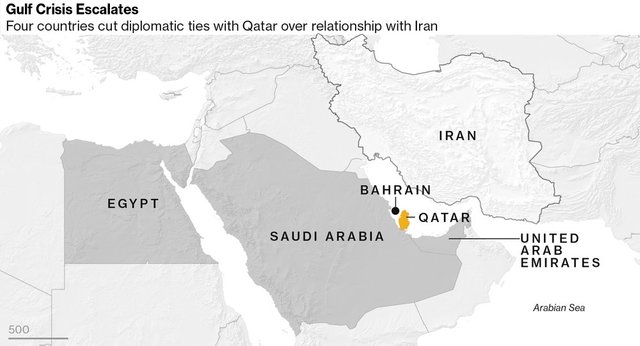 As we noted first last night, just days after president Trump left the region, a "geopolitical earthquake" took place in the Middle East as the rift between Qatar and other members of the Gulf Cooperation Council exploded with Bahrain, UAE, Saudi Arabia, and Egypt cutting all diplomatic ties with Qatar accusing it of "spreading chaos," by funding terrorism and supporting Iran. Saudi Arabia, Bahrain, the United Arab Emirates and Egypt all said they will suspend air and sea travel to and from the Gulf emirate. Saudi Arabia will also shut land crossings with its neighbor, potentially depriving the emirate of imports through its only land border.
As we noted first last night, just days after president Trump left the region, a "geopolitical earthquake" took place in the Middle East as the rift between Qatar and other members of the Gulf Cooperation Council exploded with Bahrain, UAE, Saudi Arabia, and Egypt cutting all diplomatic ties with Qatar accusing it of "spreading chaos," by funding terrorism and supporting Iran. Saudi Arabia, Bahrain, the United Arab Emirates and Egypt all said they will suspend air and sea travel to and from the Gulf emirate. Saudi Arabia will also shut land crossings with its neighbor, potentially depriving the emirate of imports through its only land border.
It was not immediately clear when the proposed measures would be implemented. Saudi Arabia said it would "begin immediate legal measures with friendly, sisterly countries and international companies to implement that measure as quickly as possible for all types of transit from and to the state of Qatar."
Saudi Arabia cited Qatar’s support of “terrorist groups aiming to destabilize the region,” including the Muslim Brotherhood, Islamic State and al-Qaeda. It accused Qatar of supporting “Iranian-backed terrorist groups” operating in the kingdom’s eastern province as well as Bahrain. Saudi Arabia, along with Bahrain and the U.A.E., gave Qatari diplomats 48 hours to leave.
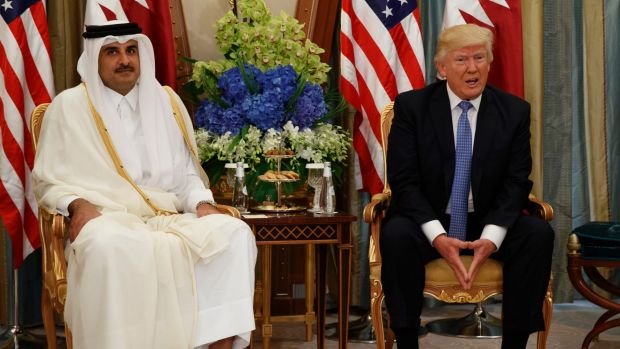
Donald Trump meets Qatar's ruler Sheikh Tamim bin Hamad al-Thani in Riyadh in May
Qatar responded by saying it regrets the "unjustified" decision of the gulf nations to sever ties and called the accusations “baseless”, saying they were part of a plan to “impose guardianship on the state, which in itself is a violation of sovereignty.”
The first hints that not all is well emerged just three days after Trump left Riyadh as part of his first international trip in May - during which the US president and Saudi King Salman singled out Iran as the world’s main sponsor of terrorism - when the state-run Qatar News Agency carried comments by Qatari ruler Sheikh Tamim bin Hamad Al Thani criticizing mounting anti-Iran sentiment. Officials quickly deleted the comments, blamed them on hackers and appealed for calm, however it was too late and Saudi and U.A.E. media outlets then launched verbal assaults against Qatar, which intensified after Sheikh Tamim’s phone call with Iranian President Hassan Rouhani over the weekend in apparent defiance of Saudi criticism.“
Qatar is right in the middle of the GCC countries and it has tried to pursue an independent foreign policy,” said Peter Sluglett, director of the Middle East Institute of the National University of Singapore quoted by Bloomberg. “The idea is to bring Qatar to heel.”
Qatar's geopolitical importance can not be underscored, not only for its vast wealth, but because Qatar is one of the biggest producer of liquefied natural gas (and arguably the source of the 6 year long Syrian proxy war, due to Qatar's documented desires to pass a natgas pipeline into Europe through Syria), and also hosts the forward headquarters of CENTCOM, the U.S. military’s central command in the Middle East.
And speaking of Qatar's wealth, while the country has a population smaller than Houston, it has one of the world's largest sovereign wealth funds with over $335 billion investments in companies from Volkswagen, to Rosneft, Barclays, Credit Suisse and Tiffany's.
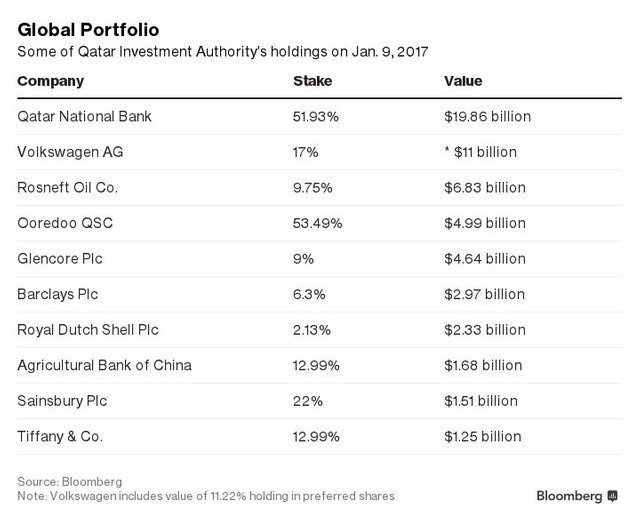
The economic fallout loomed immediately, as Abu Dhabi's state-owned Ethihad Airways, Dubai's Emirates Airline and budget carrier Flydubai said they would suspend all flights to and from Doha from Tuesday morning until further notice. Qatar Airways said on its official website it had suspended all flights to Saudi Arabia.
What prompted the surprising move by the Gulf-states?
According to some, emboldened by "warmer" ties with the US under President Trump, the Saudi-led alliance is seeking to stamp out any opposition to forming a united front against Shiite-ruled Iran. And while Monday’s escalation is unlikely to hurt energy exports from the Gulf, it threatens to have far-reaching effects on Qatar according to Bloomberg.
“There are going to be implications for people, for travelers, for business people. More than that, it brings the geopolitical risks into perspective,” Tarek Fadlallah, the chief executive officer of Nomura Asset Management Middle East, said in an interview to Bloomberg Television. “Since this is an unprecedented move, it is very difficult to see how it plays out.”
The stunned confusion explains the sudden, adverse reaction in Qatar assets, which saw the Qatar QE Index of stocks plunge tumble 8%, the most since 2009 to the lowest since January 2016...
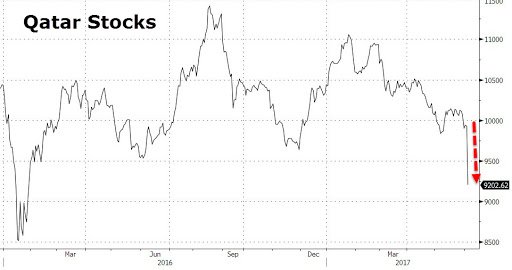
... while Dubai's index fell 1.2%. Separately, Qatar bond yields surged in the worst day in 7 months as Qatar CDS spiked to 2 month highs.

There were also fireworks in the FX arena, where forward contracts for the Qatari riyal soared by over 200bps to 4.05%, suggesting a currency devaluation may be imminent as a result of the economic blockade.
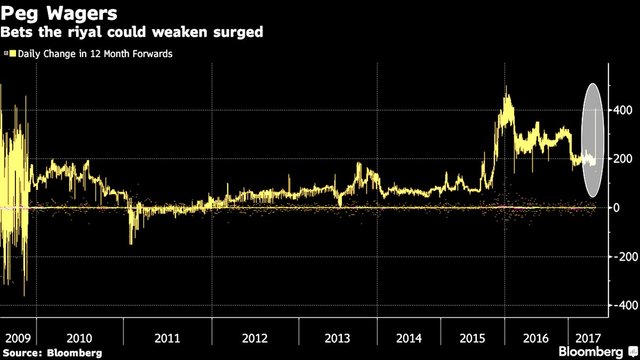
While Brent initially rose as much as 1.6% to $50.74 a barrel, it has since pared all gains as concerns that the tenuous OPEC alliance may be about to collapse, resulting in a fresh flood of crude in the market. That said, keep an eye on the Straits of Hormuz: heightened tensions between Saudi Arabia, the world’s biggest crude exporter, and Iran typically draw market attention to the tight waterway through which about 30% of the seaborne oil trade passes.
Politicians, largely behind the curve, chimed in and U.S. Secretary of State Rex Tillerson said it’s important that the Gulf states remain unified and encouraged the various parties to address their differences. Speaking at a news conference in Sydney, he said the crisis won’t undermine the fight on terrorism. “What we’re seeing is a growing list of some irritants in the region that have been there for some time,” Tillerson said. “Obviously they’ve now bubbled up to a level that countries decided they needed to take action in an effort to have those differences addressed.”
Making the matter a particular headache for the US State Department is that all five countries involved in the dispute are U.S. allies, and Qatar has committed $35 billion to invest in American assets. The Qatar Investment Authority, the country’s sovereign wealth fund, plans to open an office in the Silicon Valley.
Then there is the issue of the 2022 World Cup: As Reuters notes, "the diplomatic broadside threatens the international prestige of Qatar, which hosts a large U.S. military base and is set to host the 2022 World Cup. It has for years presented itself as a mediator and power broker for the region's many disputes. Kristian Ulrichsen, a Gulf expert at the U.S-based Baker Institute, said if Qatar's land borders and air space were closed for any length of time "it would wreak havoc on the timeline and delivery" of the World Cup."
Not the First Time
As Bloomberg reminds us, this is not the first time Qatar has been singled out and disagreements among the six GCC members have flared in the past; tensions with Qatar could be traced to the mid-1990s when Al Jazeera television was launched from Doha, providing a platform for Arab dissidents to criticize autocratic governments in the region except Qatar’s.
The Gulf nation also played a key role in supporting anti-regime movements during the Arab Spring, acting against Saudi and U.A.E. interests by bankrolling the Muslim Brotherhood’s government in Egypt. Qatar also hosts members of Hamas’s exiled leadership and maintains ties with Iran.
In 2014, Saudi Arabia, the U.A.E. and Bahrain temporarily withdrew their ambassadors from Qatar. That dispute centered on Egypt following the army-led ouster of Islamist President Mohamed Mursi, a Muslim Brotherhood leader. This time the measures are more severe than during the 2014 incident, when Saudi Arabia, Bahrain and the UAE withdrew their ambassadors from Doha, again alleging Qatari support for militant groups. At that time, travel links were maintained and Qataris were not expelled.
In 2011, Qatar used its media and political clout to support long-repressed Islamists in the "Arab Spring" uprisings in several Arab countries. Muslim Brotherhood groups allied to Doha are now mostly on the backfoot in the region, especially after a 2013 military takeover in Egypt ousted the elected Islamist president.
The former army chief and now president, Abdel Fattah al-Sisi, along with the new government's allies in Saudi Arabia and the UAE, blacklist the Brotherhood as a terrorist organization. Egypt, the Arab world's most populous nation, said on its state news agency that Qatar's policy "threatens Arab national security and sows the seeds of strife and division within Arab societies according to a deliberate plan aimed at the unity and interests of the Arab nation."
The crisis comes just weeks after Moody’s cut Qatar’s credit rating by one level to Aa3, the fourth-highest investment grade, citing uncertainty over its economic growth model.
“Qatar is economically and socially most vulnerable from food and other non-energy imports,” said Paul Sullivan, a Middle East expert at Georgetown University. “If there is a true blockade, this could be a big problem for them. Rules stopping citizens of the U.A.E., Saudi Arabia and Bahrain from even transiting via Qatar could cause significant disruptions.”
Iran also chimed in, with an official saying the Gulf crisis is a fallout from Trump Saudi visit: "Rift and crumbling of unity” among Gulf nations "first result of the sword dance in Riyadh," Hamid Aboutalebi, a deputy chief of staff for political affairs, said on Twitter. The comments were a reference to Donald Trump’s Saudi visit last month, when he took part in a ceremonial sword dance with Saudi officials“
Time for sanctions has ended, cutting diplomatic ties, closing borders, blockading nations” is not the way to end crisis, the Iranian added and said that Saudi, UAE, Egypt, Bahrain need to choose “democracy at home and talks in the region.”
A Russian envoy in Vienna, Vladimir Voronkov, was cited by RIA saying that that tensions between Qatar, Middle Eastern nations are a sign of political destabilization in region.
Finally, with confusion still rampant over last night's events, here courtesy of Bloomberg is a recap of key reactions by various analysts and investors who believe the damaged diplomatic ties will lead to increased volatility and pessimism toward Middle Eastern assets. Here are some views on the move by market participants:
Tarek Fadlallah, chief executive officer of Nomura Asset Management Middle East:
- “Clearly this is going to rattle investors, mostly foreign investors, that have to play a key role in regulation reform and investment program.”
- “Political uncertainty, particularly given recent headlines on Trump’s visit, make investors wary of investing not just in Qatar specifically, but in region more broadly”
- Expect spike in volatility, followed by downward move in markets in general
Marwan Shurrab, head of high net worth and retail equities brokerage at Al Ramz in Dubai
- Sees volatility increasing in the very short-term
- Investors will watch for any kind of announcement, or further clarification coming from governments or companies
- Investors will assess which companies have the biggest exposure to the region and therefore, have potential revenues at risk
- Some long-term investors could find opportunities if any signal of potential recovery
Majd Dola, senior research analyst at Al Ramz Capital in Dubai
- Many U.A.E. companies have operational exposure to Qatar ranging from mid- to-large size projects, sees some “negative economic impact on already struggling companies”
- Notes Drake & Scull has 500m dirhams worth of projects in Qatar; Arabtec has two joint ventures, pending legal cases, and receivables; DAMAC announced a 500m-dirham tower in Doha recently
- While hard to quantify the direct impact on those companies, it won’t be positive in short- term
- “If we take this one step further, Qatar is set to host World Cup 2020, which created a massive potential pipeline for U.A.E. developers and contractors”
- Qatar investment funds might also be under pressure to liquidate U.A.E. holdings
- Companies like DXBE (11% owned by Qatar investment) might face further pressure if things moved further in negative direction
Abdul Kadir Hussain, head of fixed income asset management at Arqaam Capital Ltd.
- Expects some initial impact on Qatari bonds.
- “A lot of them are held in hold-to-maturity books so I don’t expect a major pullback.”
- Still, expects a small narrowing of bond spreads
- Doesn’t expect move to affect bonds across the GCC at this point since they are “relatively cheap” for their ratings
- Given the lull in market due to summer and Ramadan, technicals are probably supportive in terms of new issuance
Peter Sluglett, director of the Middle East Institute of the National University of Singapore
- “Desire of the Trump administration is that nobody in that region should have any sort of relations with Iran. Qatar is right in the middle of the GCC countries and it has tried to pursue an independent foreign policy. So the idea is to bring Qatar to heel”
As for the biggest question of all: is Qatar's ambition for a trans-Syrian nat gas pipeline now officially over, the jury is still out...
ZeroHedge
-----
For only the best of ZeroHedge and articles relating to Steem, Follow me @Zer0Hedge
Will we see and increase in oil price because of this? Is this in some way a possible route to limit the ease of Qatar to get oil to market, thus driving up the price for the US and other oil producing neighbors? Just a thought. Top notch article @zer0hedge!
This is going to get interesting. Qatar can still be a part of Iran-Russia's pipeline across Syria of one of the other states between them and Iran will allow it. The Saudi's appear to be anticipating this and hoping to achieve more leverage by making them pick sides now, instead of hedging their bets.
Disclaimer: I am just a bot trying to be helpful.
This had my LOLing - Saudi Arabia cited Qatar’s support of “terrorist groups aiming to destabilize the region"